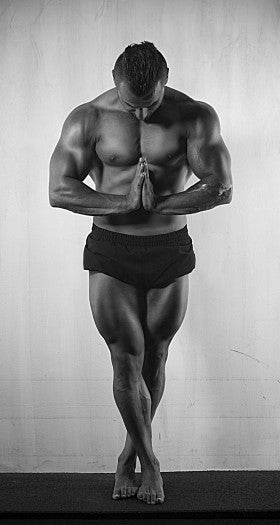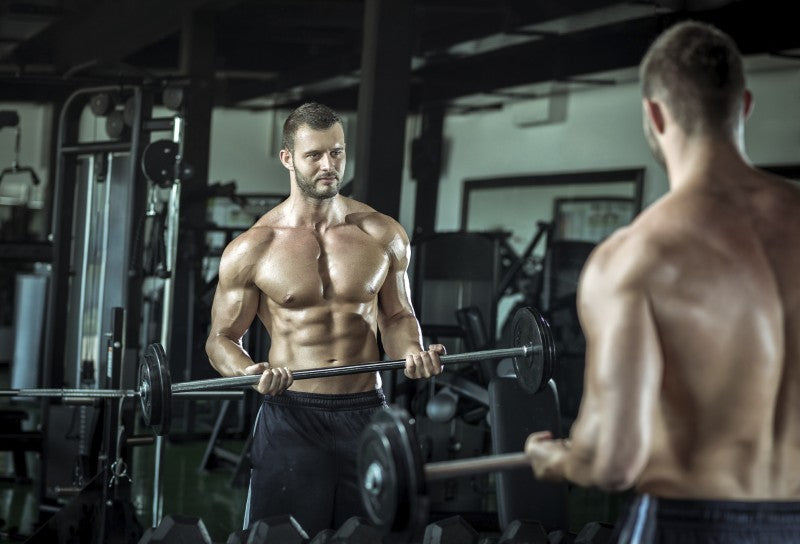You just finished your last contest of a very successful contest season. A few days have passed and you are feeling lost. The food, training, cardio, posing, and other aspects of contest prep have taken up a large portion of your free time in the past months.
Through your hard work, your goal has been achieved and the offseason is here, but you are unsure of where to go next. Do you stay stage-lean? Do you
gain weight? If so, how much weight should you gain?
Many competitors can relate to this scenario so I wanted to address some of the factors to consider when determining how much weight a competitor should gain in the offseason.
However, before getting into these factors, let's make it clear that staying stage-lean year round is not healthy or sustainable. When an individual diets down to stage-lean conditioning, there is a reduction in numerous hormones including
testosterone, thyroid hormone and leptin with an increase in other hormones such as cortisol and ghrelin.

Taken together, these hormonal changes result in reductions in metabolic rate, increased hunger, and muscle strength and size loss. All of these changes are common and have even been observed in high level natural bodybuilders during successful contest preps.
[1][2]Remaining stage-lean long-term and prolonging the amount of time spent in this negative hormonal state is not going to be conducive to muscle size- and strength-gain during the offseason. In worst-case scenarios it may result in long-term health consequences such as hypothyroidism or chronically low testosterone levels requiring pharmaceutical treatment by a physician.
In addition to the aforementioned changes, it is common for women to lose their menstrual cycle during contest prep.
[3][4][5] This may result in numerous health consequences such as increased bone loss.
[6]Therefore, it is clear that remaining stage-lean long-term is not going to be conducive to either progress towards looking your best ever the next time you step onstage or long-term health.
Since staying stage-lean year-round is not sustainable, that means you will need to gain weight in the offseason, but how much weight?
There is no ?right? amount of offseason weight gain for everyone. Ultimately, this will depend upon a number of factors, many of which are discussed below:
Bulking Diet - Stay Lean and Mean in the Offseason?
How much muscle do you need to gain in the offseason?
For a natural athlete who has been training for a long period of time, adding significant muscle mass is going to require a caloric surplus. As a result, an athlete needing to gain more muscle mass may need to let their offseason weight drift up a bit higher as a result of spending a prolonged time in a caloric surplus slowly gaining.
What is your age?
Younger competitors who have not been training as long have a greater capacity for growth due to the fact that their hormone levels are more optimal for muscle growth and they are further from their genetic ceiling. Oftentimes, they also have a faster metabolic rate which makes dieting down for shows easier.
As a result, it may be in a younger competitor?s interest to let their weight drift up a bit more to take advantage of a prime growing period in their training career, while an older competitor may be better staying a bit closer to stage-weight.
What is your gender?
Males have a greater capacity for muscle growth than females due to higher levels of anabolic hormones, such as testosterone. In addition, males tend to have a higher metabolic rate due to higher body mass and muscle mass. Therefore, a female competitor may want to stay a bit closer to stage-lean than their male counterparts.

What division do you compete in?
Remaining stage-lean is not sustainable regardless of the division. However, those who compete in divisions that require competitors to be leaner on stage (e.g. bodybuilding) may need to gain a bit more weight during the offseason to see normalization of hormone levels and metabolic rate compared to those divisions that do not require competitors to get quite as lean (e.g. bikini).
In addition, competitors who are in classes that require more muscle mass (e.g. bodybuilding) may need to let weight drift a bit more in the offseason to maximize muscle gain compared to those in classes where you can be ?too big? (e.g. bikini).
How long is your offseason?
The length of an offseason will play a role in the distance a competitor can drift from stage-weight. Competitors with short offseasons will need to stay closer to stage-lean than those with longer offseasons to allow them to get back into contest shape in time.
As a side note, I generally recommend that all natural athletes take at least 1 year between contests (preferably longer). For those looking to make significant visual changes in their physique between contest seasons, 2-3+ years between contests seasons will be more optimal.
How easy is it for you to lose weight during contest prep?
There is variability in metabolic rate between competitors. Some competitors simply have a faster metabolism and easier time getting stage-lean than others. For competitors who struggle to get stage-lean, staying a bit closer to minimize the amount of weight to cut during contest prep may be beneficial.
How lean did you get at your last show?
At a competitor?s first competition, it is common to not come in truly stage-lean whereas at the natural pro level conditioning reaches extreme levels. For competitors who did not get to true stage-lean conditioning, offseason gain is not going to need to be as large to normalize hormone levels as it will be for those who reached true stage-lean and extreme levels of body composition.
After contest prep, when are you no longer food-focused?
Any of us who have been stage-lean know that when we get close to stage-lean and are really grinding, the amount of time we start thinking about food significantly increases. Oftentimes, meals become much more elaborate and time-intensive and we try to milk everything we can out of our limited intake.
This relationship with food is not necessarily a ?normal? thing and there should be an effort in the offseason to establish a healthier relationship with food where you are not as food-focused. Allowing body weight and body fat to come up to a level where you are not food-focused is going to be important for long-term psychological health and a healthy relationship with food.
Females: when does your menstrual cycle normalize?
As mentioned above, it is common for a female to lose her menstrual cycle during contest prep and this may lead to a number of health consequences including bone loss if the competitor was to remain without her cycle long-term. Therefore, enough weight needs to be gained in the offseason to normalize hormone levels and menstrual cycle in females for the purposes of long-term health.
At what weight do feel ?normal? again?
It is no secret that being stage-lean looks great, but feels terrible. Energy levels are reduced, hunger is high, sex drive is nonexistent, sleep quality is poor, patience is low, and things just don't feel ?normal? in general.
These things will normalize once caloric intake and body weight are increased; however, weight needs to be allowed to drift to the point where these things return to normal again. If this does not occur and an individual still feels like they are struggling, they will be less likely to train intensely or sustain that weight long-term.
Are strength levels increasing?
As discussed previously, strength loss is common during natural bodybuilding contest prep, even in high-level competitors. Staying stage-lean, or close to it, is going to result in strength levels remaining low and will reduce the amount of muscle mass an individual can gain in the offseason.
In general, it is a good idea to let body weight increase to a point where strength is high again in order to maximize progress.
Where does your weight settle when you get back to a comfortable caloric intake?
Most individuals have a range of bodyweight where they can sit comfortable. Venturing below this range takes restraint and they may experience a number of the effects of dieting discussed above whereas venturing above this range oftentimes takes some force-feeding resulting in excessive fat gain leading to a more difficult prep the next time.
An ideal amount of gain for a competitor is going to usually be one that allows them to sit somewhere in this comfortable weight range during the offseason.
Psychologically, how much weight/fat gain can you tolerate?
Psychological disorders are common amongst physique competitors and should be addressed with a professional prior to dieting down for a competition. In general, dieting down for a show will only amplify pre-existing issues with food, exercise and/or body image. Even in competitors without signs of pre-existing psychological disorders, contest prep may bring some of these issues to the surface.
As a result, some individuals may struggle more with weight gain after a show than others. This does not mean that psychologically struggling with weight gain is a reason to stay stage-lean; however, an individual who struggles a bit more with this may want to slow the rate at which they re-gain weight or stay a bit closer to stage-lean provided that they do gain enough to normalize things hormonally and metabolically.
If an individual is struggling with weight gain post-contest I highly recommend consulting a professional to work through things prior to jumping back into contest prep.
What does that mean for me in terms of offseason weight gain?
There is no universally ideal offseason weight gain for everyone and the ideal amount of offseason weight gain is going to differ among competitors depending upon the factors discussed above. On the low end, it may be that only a 5-10lb gain is needed; however, 30+lbs may be needed on the high end depending upon the individual and their situation.
Ultimately, a competitor needs to gain enough weight back that they feel normal and are gaining strength at a weight they can hold without feeling restricted. However, they also do not want to gain too much back so they don't get too far over stage-lean.
I hope that this article has given you some things to consider during your next offseason and that it will help you to make improvements and come in at your best ever the next time you step onstage!
References
1) Rossow, L.M., et al., Natural bodybuilding competition preparation and recovery: a 12-month case study. Int J Sports Physiol Perform, 2013. 8(5): p. 582-92.2) Kistler, B.M., et al., Case Study: Natural Bodybuilding Contest Preparation. Int J Sport Nutr Exerc Metab, 2014.3) Kleiner, S.M., T.L. Bazzarre, and M.D. Litchford, Metabolic profiles, diet, and health practices of championship male and female bodybuilders. J Am Diet Assoc, 1990. 90(7): p. 962-7.4) Walberg, J.L. and C.S. Johnston, Menstrual function and eating behavior in female recreational weight lifters and competitive body builders. Med Sci Sports Exerc, 1991. 23(1): p. 30-6.5) Elliot, Characteristics of anabolic-androgenic and steroid-free bodybuilders The Physician and Sports Medicine, 1987. 15(6).6) Miller, K.K. and A. Klibanski, Clinical review 106: Amenorrheic bone loss. J Clin Endocrinol Metab, 1999. 84(6): p. 1775-83.

 Taken together, these hormonal changes result in reductions in metabolic rate, increased hunger, and muscle strength and size loss. All of these changes are common and have even been observed in high level natural bodybuilders during successful contest preps. [1][2]
Taken together, these hormonal changes result in reductions in metabolic rate, increased hunger, and muscle strength and size loss. All of these changes are common and have even been observed in high level natural bodybuilders during successful contest preps. [1][2]